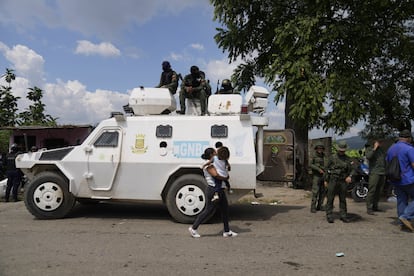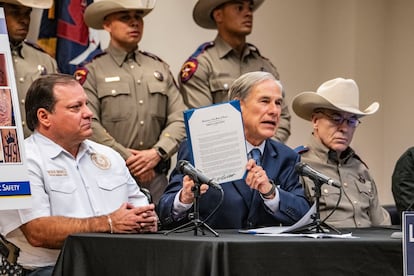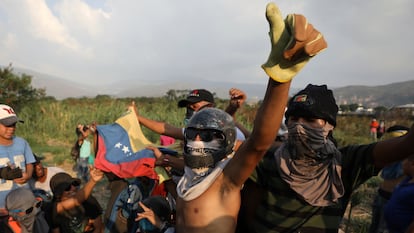The elusive trail of Tren de Aragua sets off alarm bells in the United States
The transnational criminal organization, which originated in Venezuela, has become widely known due to growing evidence of its presence on US soil and mentions by politicians, but very little is known about its activities and level of organization

Three Spanish words have recently crept into the American lexicon: Tren de Aragua. While reports of the Venezuelan criminal gang’s presence in the United States have been trickling in for some time, over the last few months, mentions of the organization by Republicans blaming the immigration policy of President Joe Biden’s administration for the gang’s activity have placed it at the forefront of the political conversation, against the backdrop of an imminent presidential election in which immigration is one of the key issues. With incidents reported from Texas to New York and from Florida to Colorado and GOP-aligned media giving it intense coverage — often exaggerated and without real evidence — Tren de Aragua, also known as TDA or simply “the Venezuelan gang,” has become the abstract favorite villain of the country’s conservative voices. However, according to the information available, security forces still know very little about its activities and level of organization.
The news and social media frenzy over Tren de Aragua began less than a month ago, when images began circulating allegedly showing gang members armed with assault rifles forcing their way into homes in a residential building in Aurora, Colorado. Headlines on more conservative publications and channels claimed that the gang had “taken over” the town, which is part of the Denver metropolitan area. Former president and Republican candidate Donald Trump also echoed the story in the presidential debate in which he faced Kamala Harris, using exactly the same expression.
In response, local police denied that the Venezuelan gang had taken over the city, or even some of its buildings, although they admitted that there was a presence of suspected members of Tren de Aragua. In Denver, the gang has been held responsible by authorities for several robberies and assaults on luxury stores that have resulted in hundreds of thousands of dollars in losses, and one homicide.

The narrative Trumpism is pushing fits neatly into the broader story regarding immigration and crime that the Republican candidate is selling. The former president repeatedly claims Venezuela — and other countries that change by the day — is “emptying its prisons and asylums” and sending criminals and the mentally ill to the United States. Trump has never provided any proof of this beyond saying that crime is down in Venezuela, and that assertion is based on unverified data from the Maduro regime. Nor is there any external evidence to support his claims. But the growing presence of Tren de Aragua, even if it is a drop in the bucket of recent Venezuelan immigration, provides some support, however circumstantial, to his xenophobic alarmism about the supposed connection between new migrants and crime.
In July, the Biden administration imposed sanctions on the gang, placing it on a list of transnational criminal organizations that includes El Salvador’s MS-13 and the Italian Camorra, and offering a $12 million reward for the arrest of its three known leaders. In September, Texas Republican Governor Greg Abbott declared Tren de Aragua a foreign terrorist organization and ordered the state department of public safety to create a task force to pursue the gang wherever it was known to be present. In the border city of El Paso, a hotel was shut down because of persistent criminal activity. Police have said the situation was exacerbated by the presence of Tren de Aragua, though they were not the only ones named. And just last week, Abbott announced a $5,000 reward for information leading to the arrest of gang members.
The name of the gang, which was created in the Tocorón penitentiary in the state of Aragua in Venezuela, has also been mentioned on Capitol Hill. Eleven Republicans led by Senator Marco Rubio of Florida, the vice president of the Senate Intelligence Committee, wrote a letter to Attorney General Merrick Garland on September 20 calling for a coordinated strategy by the Biden administration to confront the gang. “The administration’s weak enforcement of immigration laws allows gangs, like Tren de Aragua, to control routes and exploit migrants en route to the border,” the letter stated.
In cities like Chicago and New York, the gang has been accused of crimes such as sex trafficking — which it carries out across almost the entire continent — drug trafficking, assaults on police, robbery, extortion and, as Republican senators claim, the exploitation of migrants. A recent article in The New York Times, citing confidential sources from the NYPD, describes what is known about the presence of Tren de Aragua in the metropolis that has received the largest number of migrants in recent years. There, according to the police, the gang has focused on stealing cell phones, robbing luxury goods, and trafficking tusi, a pink synthetic drug.

In interviews conducted by security forces with detainees suspected of being members of Tren de Aragua, the gang’s strategies have been outlined. For now, it is known that they usually reconnect with other members in shelters for immigrants —although people currently in the reception centers say they have not noticed the presence of the gang — and they communicate through private WhatsApp groups. They also report that there are several identifying marks: tattoos of watches, anchors, crowns, or verses with the word “warrior”; Jordan brand sportswear; and, for reasons that are not clear, an Albanian flag on social media.
While these are all advances in the intelligence needed to take on a criminal organization, at this point basic information such as its size or level of coordination, both within the United States and internationally, remains a mystery. On the surface, the crimes attributed to Tren de Aragua in the U.S. do not appear to be connected to its leadership in Venezuela. There is also no indication that they are related to each other, but there is concern that they may, sooner rather than later, begin to organize across different states.
In May, a federal investigation uncovered a sex-trafficking operation spanning Louisiana, Texas, Virginia, Florida, and New Jersey. It followed the modus operandi used by Tren de Aragua from Chile to Mexico: Venezuelan women forced into prostitution to pay off debts to human traffickers. The gang’s foray into a wide range of criminal activities has also raised the risk of confrontations with rival groups. There have already been reported clashes with former members who call themselves the Anti-Tren, as well as with other established gangs like MS-13, as well as occasional alliances.
Tren de Aragua, however, seems to be generating more fear than other criminal groups because — in addition to having appeared in a context in which its name is being used for electoral purposes — of its level of violence and lack of scruples. For Tren de Aragua, anyone is a valid victim and no criminal activity is off-limits.

A look at Venezuela also offers little certainty about Tren de Aragua. A year ago, the authorities in Caracas claimed it had dismantled the gang after regaining control of the Tocorón prison; but since then, news about its activities in various Latin American countries has been constant. In April, Venezuelan Foreign Minister Yván Gil declared that Tren de Aragua is “an international media fiction.” More recently, Diosdado Cabello, considered the second-in-command of Chavismo, accused TDA of being behind an alleged assassination attempt backed by the opposition and the United States to kill Nicolás Maduro after the July elections.
In this context of non-existent cooperation with Venezuela, the U.S. police have increased their inspection protocol to detect possible members of Tren de Aragua at the border, with close scrutiny of cell phones or tattoos and more in-depth interviews. Meanwhile, since the name of the gang appeared in headlines and conversations in the U.S., Americans walk around in fear and suspicion of any Venezuelan migrant.
Sign up for our weekly newsletter to get more English-language news coverage from EL PAÍS USA Edition
Tu suscripción se está usando en otro dispositivo
¿Quieres añadir otro usuario a tu suscripción?
Si continúas leyendo en este dispositivo, no se podrá leer en el otro.
FlechaTu suscripción se está usando en otro dispositivo y solo puedes acceder a EL PAÍS desde un dispositivo a la vez.
Si quieres compartir tu cuenta, cambia tu suscripción a la modalidad Premium, así podrás añadir otro usuario. Cada uno accederá con su propia cuenta de email, lo que os permitirá personalizar vuestra experiencia en EL PAÍS.
¿Tienes una suscripción de empresa? Accede aquí para contratar más cuentas.
En el caso de no saber quién está usando tu cuenta, te recomendamos cambiar tu contraseña aquí.
Si decides continuar compartiendo tu cuenta, este mensaje se mostrará en tu dispositivo y en el de la otra persona que está usando tu cuenta de forma indefinida, afectando a tu experiencia de lectura. Puedes consultar aquí los términos y condiciones de la suscripción digital.









































